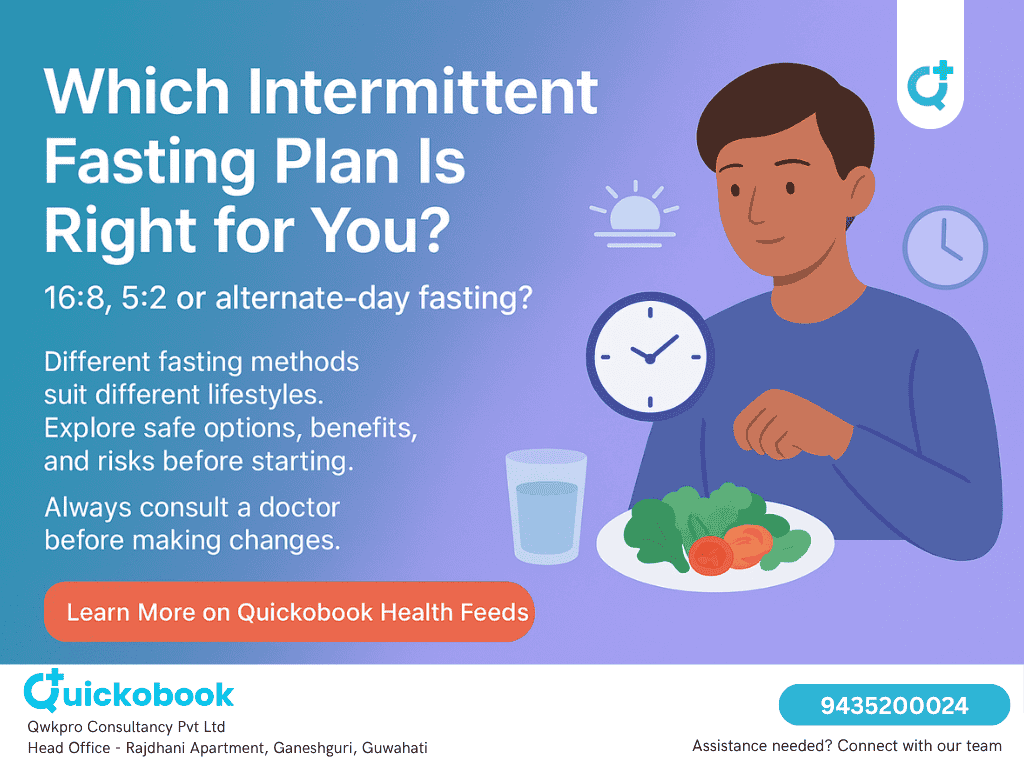Intermittent fasting (IF) has become one of the most talked-about lifestyle choices in recent years. From celebrities to health coaches, everyone seems to be adopting some form of fasting. But the question most people have is simple: Which intermittent fasting plan is right for me?
The truth is, intermittent fasting is not a “one-size-fits-all” method. Different plans work better for different people depending on their health goals, medical conditions, daily routine, and even eating preferences. That’s why understanding the various types of intermittent fasting and how they affect the body is important before starting.
This blog will guide you through:
-
What intermittent fasting is and how it works
-
The most popular intermittent fasting schedules
-
Benefits and challenges of each plan
-
How to choose the right plan for your lifestyle
-
FAQs about intermittent fasting
-
How Quickobook can help you book a doctor, nutritionist, or weight loss consultation
What Is Intermittent Fasting?
Intermittent fasting (IF) is an eating pattern that focuses on when you eat rather than what you eat. Instead of counting calories or following a strict diet plan, intermittent fasting uses set periods of eating and fasting to regulate your metabolism, improve fat burning, and support overall health.
During fasting periods, your insulin levels drop, which allows your body to access stored fat for energy. At the same time, fasting may improve hormone balance, support brain health, and reduce inflammation.
Why Is Intermittent Fasting So Popular?
There are several reasons why IF has gained global attention:
-
It’s flexible and doesn’t require eliminating entire food groups.
-
It works well with different lifestyles, including vegetarian, keto, or balanced diets.
-
It can be easier to follow compared to calorie-restriction diets.
-
Scientific studies show benefits for weight loss, blood sugar control, heart health, and longevity.
But the right intermittent fasting plan depends on your individual needs, and that’s where choosing carefully becomes important.
READ ALSO: High Blood Pressure – Silent Symptoms And Long-term Risks
Popular Intermittent Fasting Plans Explained
Here are the most common intermittent fasting methods, along with who they are best suited for:
1. The 16/8 Method
-
How it works: Fast for 16 hours, eat within an 8-hour window (example: 12 pm–8 pm).
-
Best for: Beginners, working professionals, and people who naturally skip breakfast.
-
Benefits: Easy to maintain, flexible, supports fat loss and better energy.
-
Challenges: May be hard for people who enjoy early breakfasts.
2. The 5:2 Diet
-
How it works: Eat normally for 5 days, and limit intake to 500–600 calories for 2 non-consecutive days.
-
Best for: People who prefer normal eating most days but can handle occasional low-calorie restrictions.
-
Benefits: Promotes calorie control, adaptable to social life.
-
Challenges: Low-calorie days may feel draining.
3. Eat-Stop-Eat (24-hour fast)
-
How it works: A complete 24-hour fast once or twice a week.
-
Best for: Experienced fasters and people aiming for deeper fat burning.
-
Benefits: Powerful for weight management and metabolic reset.
-
Challenges: Requires discipline; not beginner-friendly.
4. Alternate-Day Fasting (ADF)
-
How it works: Fast every other day, with either zero calories or up to 500 calories on fasting days.
-
Best for: Those seeking rapid results and improved insulin sensitivity.
-
Benefits: Quick weight loss, improved metabolic health.
-
Challenges: Difficult for long-term sustainability.
5. Warrior Diet (20/4 Method)
-
How it works: Fast for 20 hours, eat within a 4-hour window (usually dinner).
-
Best for: People who prefer eating one big meal.
-
Benefits: May boost growth hormone and discipline.
-
Challenges: Can lead to overeating in the eating window.
6. Time-Restricted Eating (TRE) Variations
-
How it works: Flexible fasting windows such as 12/12 or 14/10.
-
Best for: Beginners or those easing into fasting.
-
Benefits: Gentle introduction, sustainable for long-term health.
-
Challenges: Slower results compared to stricter methods.
Benefits of Intermittent Fasting
-
Weight Loss & Fat Burning – By lowering insulin levels, fasting allows the body to tap into stored fat.
-
Improved Metabolism – Supports better blood sugar regulation and reduces insulin resistance.
-
Heart Health – May reduce cholesterol, blood pressure, and inflammation.
-
Brain Health – Encourages the production of brain-protective proteins.
-
Longevity – Some studies link fasting to slower aging and cellular repair.
-
Flexibility – Works with different eating habits and cultures.
How to Choose the Right Intermittent Fasting Plan
Ask yourself:
-
Do I want a beginner-friendly option? → Try 16/8 or 12/12.
-
Can I handle calorie restriction some days? → Try 5:2.
-
Do I want faster results and discipline? → Try ADF or Eat-Stop-Eat.
-
Do I prefer one big meal? → Consider Warrior Diet.
Safety Tips Before Starting
-
Drink enough water during fasting periods.
-
Break fasts with nutrient-dense meals (whole grains, lean protein, veggies, healthy fats).
-
Avoid binge eating after fasting.
-
If you have diabetes, low blood pressure, or any chronic illness, consult a doctor first.
-
Pregnant and breastfeeding women should avoid strict fasting without medical supervision.
How Quickobook Can Help You
Starting intermittent fasting may raise questions like:
-
Am I choosing the right plan for my body?
-
Do I need medical guidance before fasting?
-
What should I eat during eating windows?
With Quickobook, you can:
-
Book a doctor consultation online for medical safety.
-
Book a nutritionist to design a personalized fasting + meal plan.
-
Get a weight loss consultation tailored to your health and lifestyle.
-
Access diet planning and health checkups easily through online booking.
This ensures that your intermittent fasting journey is safe, effective, and sustainable.
FAQs on Intermittent Fasting
1. Can I drink water during intermittent fasting?
Yes, water, black coffee, and green tea are allowed during fasting. /
2. How long does it take to see weight loss results?
Most people notice changes in 2–4 weeks, depending on consistency and diet quality. /
3. Will intermittent fasting slow my metabolism?
Short-term fasting improves metabolism. Extreme long-term fasting may reduce it. /
4. Can I exercise while fasting?
Yes, light and moderate exercise is safe. Intense workouts are better during eating windows. /
5. Is intermittent fasting safe for everyone?
It is generally safe, but people with chronic conditions should consult a doctor. /
6. Can I lose belly fat with intermittent fasting?
Yes, fasting helps reduce visceral fat, including belly fat. /
7. What foods should I eat to break my fast?
Lean proteins, vegetables, fruits, nuts, whole grains, and healthy fats are best. /
8. Do I need to count calories with intermittent fasting?
Not strictly, but avoiding overeating is essential. /
9. Can intermittent fasting help with diabetes?
It may improve insulin sensitivity, but medical guidance is necessary. /
10. How can Quickobook support my fasting journey?
By helping you book doctors, nutritionists, and diet consultations online, making fasting safe and effective. /
Final Thoughts
Intermittent fasting is a powerful lifestyle tool, but the right plan depends on your health goals, lifestyle, and medical needs. Beginners often do best with 16/8 or 12/12, while advanced fasters may benefit from ADF or Eat-Stop-Eat.
The most important thing is sustainability. Choose a plan that you can stick with in the long term, while supporting your health and well-being. And if you’re unsure, don’t experiment blindly—consult a doctor or nutritionist.
Quickobook makes this easier by connecting you with trusted doctors and nutritionists. Whether you want a weight loss consultation, customized diet plan, or a health checkup, Quickobook helps you make fasting safe and effective.










Comments (0)
No comments yet. Be the first to share your thoughts!
Leave a Comment